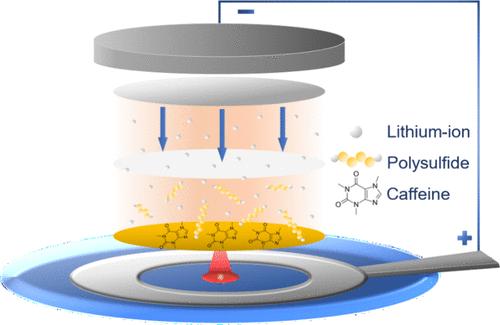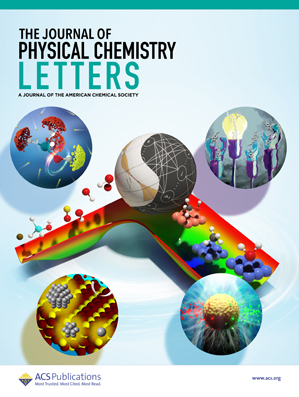In-Operando FTIR Spectroscopy Study on Rapid Polysulfide Binding via Caffeine in Lithium–Sulfur Batteries
IF 4.8
2区 化学
Q2 CHEMISTRY, PHYSICAL
引用次数: 0
Abstract
Lithium–sulfur batteries are limited by the high mobility of polysulfides in the electrolyte, which allows them to migrate from the cathode to the lithium anode. This is known as polysulfide shuttling and simultaneously diminishes the active material and poisons the anode. Various cathode additives have been shown empirically to mitigate this problem, although the mechanism is not often ascertained experimentally. Herein, we demonstrate for the first time that the small molecule additive caffeine reduces the polysulfide shuttling current in a lithium–sulfur battery and decreases the capacity fade in galvanostatic cycling experiments. Using in-operando Fourier transform infrared (FTIR) spectroscopy, we identify reversible shifts in the carbonyl stretching frequencies of caffeine that are strongly correlated with the onset of polysulfide formation during both discharging and charging. These spectroscopic shifts are consistent with a polar–polar interaction between polysulfides and the carbonyl groups of caffeine, leading to the observed decrease in polysulfide mobility.

锂硫电池中咖啡因快速结合多硫化物的FTIR光谱研究
锂硫电池受到电解液中多硫化物的高迁移率的限制,这使得它们可以从阴极迁移到锂阳极。这就是所谓的多硫化物穿梭,同时减少活性物质和毒害阳极。各种阴极添加剂已显示经验,以减轻这一问题,虽然机制往往是不确定的实验。在此,我们首次证明了小分子添加剂咖啡因降低了锂硫电池中的多硫穿梭电流,并在恒流循环实验中降低了容量衰减。利用傅里叶变换红外(FTIR)光谱,我们发现咖啡因羰基拉伸频率的可逆变化与放电和充电过程中多硫化物形成的发生密切相关。这些光谱变化与多硫化物和咖啡因羰基之间的极性相互作用一致,导致观察到的多硫化物迁移率降低。
本文章由计算机程序翻译,如有差异,请以英文原文为准。
求助全文
约1分钟内获得全文
求助全文
来源期刊

The Journal of Physical Chemistry Letters
CHEMISTRY, PHYSICAL-NANOSCIENCE & NANOTECHNOLOGY
CiteScore
9.60
自引率
7.00%
发文量
1519
审稿时长
1.6 months
期刊介绍:
The Journal of Physical Chemistry (JPC) Letters is devoted to reporting new and original experimental and theoretical basic research of interest to physical chemists, biophysical chemists, chemical physicists, physicists, material scientists, and engineers. An important criterion for acceptance is that the paper reports a significant scientific advance and/or physical insight such that rapid publication is essential. Two issues of JPC Letters are published each month.
 求助内容:
求助内容: 应助结果提醒方式:
应助结果提醒方式:


